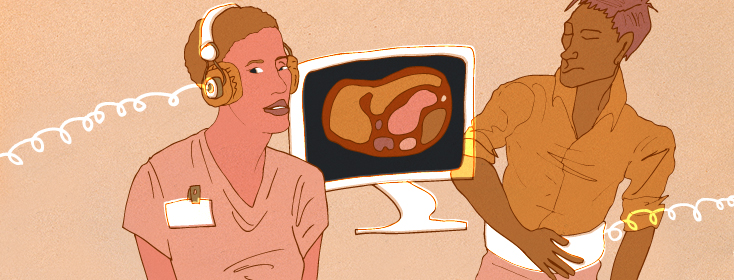A New Way to Diagnose IBS: An Acoustic Belt
I do not remember my diagnosis journey for IBS fondly. It consisted of me having to take a whole semester off of college to be probed and prodded in a bunch of uncomfortable, painful and embarrassing ways by a host of different doctors. After blood tests, stool samples, a pelvic and upper abdominal ultrasound, and a barium swallow still revealed nothing remarkable, I was scheduled for a colonoscopy. I wouldn't want to ever relive that journey or wish it on anyone else. This is why I am heartened to hear that a new diagnostic tool is in the works that would not require any laxatives or subsequent probing into such sensitive and intimate parts of the body.
Acoustic belt
Researchers from the Marshall Centre at the University of Western Australia in Perth published their findings at the Journal of Gastroenterology just this past May 2018 about using an acoustic belt to diagnose IBS.1 That's right: this is a belt one can wear around their abdomen that, using machine learning techniques, detects patterns in the sounds that are made by the human gut as it works and differentiates those that are made in people who suffer from IBS. More heartening news: the Centre director, Barry Marshall, is a Nobel Laureate and one of the world's leading gastroenterologists. What's even more interesting is that the belt relies on acoustic technology first invented in order to detect and then track termites eating through the walls of houses and buildings.
"The Noisy Guts Project"
As part of the study, dubbed "The Noisy Guts Project," the belt was first fitted on 31 people with IBS diagnoses and 37 people without IBS. Their intestinal sounds were then tracked for 2 hours after fasting and then for 40 minutes after a meal. The system was then able to use this data to create an "IBS acoustic index model." For the next phase of the study, the belt was then fitted onto 15 patients with IBS and 15 people without--and correctly diagnosed IBS in 87 percent of cases.2
It may be awhile until this little contraption makes its way to the market to be used in the mainstream, but my hopes is it will be sooner rather than later and spare those with grumbly guts the discomfort and pain of a colonoscopy.

Join the conversation